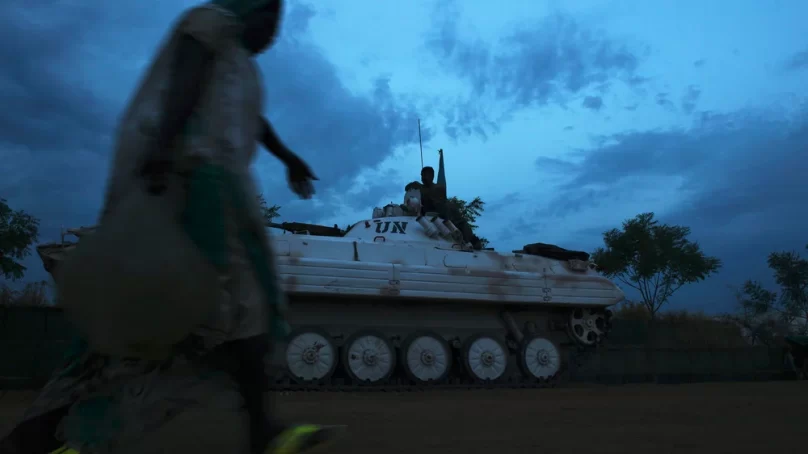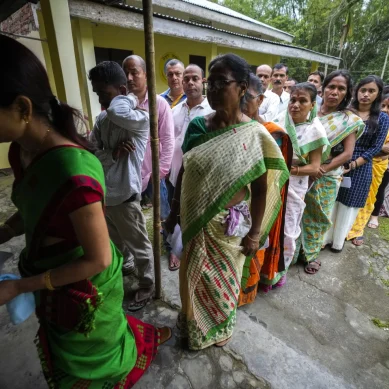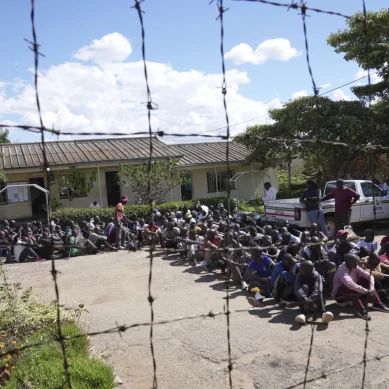
Accounts of sexual abuse by aid workers at a UN-run camp in South Sudan first surfaced in 2015, two years after the civil war erupted. Seven years on, such reports not only continue but have recently increased, an investigation by The New Humanitarian and Al Jazeera found.
The revelations come at a worrying time. UN officials say up to 5,000 more people may be headed toward the Protection of Civilians (PoC) site in Malakal, fleeing violence that has killed as many as 300 people, some of whom drowned in a river as they tried to escape the fighting.
Camp residents say they fear the new violence could seep into the UN camp – recent clashes between ethnic Shilluk and Nuer in the camp have already flared. If the camp becomes more crowded, residents worry there may be more cases of sexual abuse and exploitation, which they say has gone largely unchecked despite a UN-led taskforce charged with tackling the problem.
Accounts of abuse began trickling in shortly after the camp opened in late 2013, but the scale of abuse has grown, according to aid workers, camp residents and victims interviewed by The New Humanitarian and Al Jazeera, as well as analysis of UN and NGO documents.
One woman said she became pregnant in 2019 by a local World Food Programme (WFP) worker. Although the relationship was consensual, most aid groups, including WFP, ban sexual relationships between aid workers and beneficiaries because of the stark power imbalances. The woman told reporters in December 2021 she was so worried about the continuing sexual abuse that she was putting her eldest daughter, now 15, on birth control.
Another woman said she was 15 when a local World Vision worker raped and impregnated her. Fearful of her future, she said she tried to hang herself before deciding to leave the camp in an attempt to build a better life.
World Vision said it was opening an immediate investigation into the woman’s case, while WFP said it could not comment on specific cases.
These women’s allegations tally with those of other camp residents – testimonies that were detailed in a UN Population Fund (UNFPA) report sent to humanitarian agencies on October 5, 2020 and shared with The New Humanitarian and Al Jazeera by an aid worker who asked to remain anonymous due to fear of reprisals.
“Sexual exploitation is experienced on a daily basis…perpetrators are mostly humanitarians.”
Report from the UN Population Fund sent to humanitarian organisations in Malakal on October 5, 2020.
In the report, residents said sexual exploitation, mostly perpetrated by humanitarian workers, was being experienced “on a daily basis”. UN and NGO workers were renting houses in the camp to have sex with women; and UN peacekeepers were paying bribes to gain access to women. Camp residents also said three girls had been raped and impregnated by a teacher in 2018 – some schools in the camp are supported by UN agencies and NGOs.
Further accounts of abuse continued for at least 18 months after the release of the report. “I received with greatest alarm information on the increased incidents of sexual abuse and exploitation in Malakal Protection of Civilians site,” Sara Beysolow Nyanti, deputy head of South Sudan’s UN peacekeeping mission, stated in a March 21, 2022 letter sent to some 17 aid organisations working in the camp, as well as camp coordination groups. A copy of the letter, which was not made public, was obtained by The New Humanitarian and Al Jazeera.
Nyanti, who assumed her role in January 2022, said the reported increase had been noted during a meeting with humanitarian partners in Malakal, which now hosts some 37,000 people.
She told reporters in a August 12 email that tackling such abuse is one of her “top priorities”, but she did not offer comment on why past strategies may have fallen short.
The reference to an increase, even if aid officials declined to give information on specific cases or were unable to provide a fuller picture, offers a rare glimpse into a grossly underreported problem, and one that continues to dog the UN and aid sector.
Aid groups acknowledged that hurdles remain in tackling such abuse. Their representatives told reporters they are working towards increasing awareness about what constitutes exploitation and how to report it. Measures include holding talks with the community, broadcasting messages over the radio, and sharing hotline numbers to raise awareness.
Although some women said sex was consensual, they also told reporters they had little other means of supporting themselves or their families without money or gifts the men provided. They said they feared if they stopped having sex with the aid workers, support would stop.
“Sexual exploitation and abuse is a consequence of the broader abuse of power and gender inequality, which is entrenched in existing social and institutional structures and practices,” Peterson Magoola, a spokesperson for UN Women, told reporters in an email. UN Women has co-chaired the task force since 2018.
According to the UN, sexual exploitation is defined as any actual or attempted abuse of one’s position of power, using vulnerability or trust, for sexual purposes. It forbids it because it is based on unequal relationships, noting any kind of transaction for sex – such as providing gifts or offering support – reflects this unequal power balance.
“Consent is irrelevant; even if someone accepts a gift or support… the transaction is still considered exploitative,” reads the guide.
UN Secretary-General António Guterres’s office did not respond to a request for comment on the The New Humanitarian and Al Jazeera’s investigation in time for publication.
The UN peacekeeping mission in South Sudan opened its bases to more than 200,000 people at the onset of the war in 2013 – an unprecedented move in the history of UN peacekeeping missions that was credited with saving thousands of lives. Malakal was one of those sites, and was intended as a temporary refuge.
Other civilian camps across the country were under UN protection until last year, when all except Malakal were placed under government control.
Due to heightened ethnic and political tensions around the town of Malakal – and continued fighting between government-backed forces and the opposition – the PoC site there was deemed too risky to redesignate and has remained under UN control.
Despite the challenges of operating in South Sudan, including access constraints, insecurity and funding cuts, the chronology of events at Malakal suggests a litany of systemic failures and missed opportunities by the aid sector. It also amounts to a deep betrayal for vulnerable women and girls who sought refuge in the camp.
“The people sexually exploiting and abusing women in [protection sites] are the very people meant to serve and protect them. Their entire lives depend on services from these same aid workers,” said Aluel Atem, a South Sudanese development economist and feminist activist who has researched and written about gender-based violence in South Sudan.
Complicating matters are the cultural, political, and gender dynamics in South Sudan.
“At a community level, [sexual exploitation and abuse] is not being perceived as a violation of individual women or children’s rights but rather as a violation of property for which the family should obtain compensation or secure marriage for their daughters,” reads a strategy report for the UN-led task force’s mandate for 2018-2021.
Although the UN and most international NGOs ban sexual relationships with aid beneficiaries, several local aid workers, who spoke to reporters on condition of anonymity for fear of losing their jobs, said they should be allowed to have relationships with women in the camp. Some said it was one of the only ways to find a wife and start a family.
“Amongst the staff, personnel and contractors working for peacekeeping and provision of aid, there is low level of knowledge on acceptable standards of behaviour…System wide implementation strategy on protection from sexual exploitation and abuse in South Sudan” (July 2018).
Many local aid workers live in the camp amongst residents and have themselves also been displaced or traumatised by war.
Despite a fragile peace agreement signed in 2018 – the second such accord to try to end a civil war that has killed nearly 400,000 people – gender-based violence has continued to surge in South Sudan.
- The New Humanitarian report











